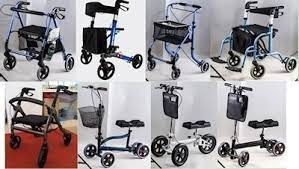ASSISTIVE DEVICES FOR DISABLED PERSONS
- Get link
- X
- Other Apps
|
ASSISTIVE
DEVICES FOR DISABLED
PERSONS An individual's functioning and independence are maintained or enhanced by assistive products, which benefit their wellbeing. Examples of assistive items include hearing aids, wheelchairs, communication aids, spectacles, prostheses, pill organizers, and memory aids. There are about 70 million disabled people in India. One in every ten children or 3% of the country's total child population also falls in this category. The most important program in our Action plan for this year was to give employment opportunities to the handicapped and enable them to lead an independent life by giving a small gift of a hearing aid, wheelchair, tricycle, or Braille kit for them and it will make a big difference. |
|
|
|
Mobility aids such as canes, crutches, wheelchairs, scooters, walking aids, prosthetics, and orthotics. people's hearing can be improved with the aid of hearing devices. People with memory, attention, or other cognitive problems can benefit from cognitive aids, such as computer or electrical assistance gadgets. People with mobility and sensory impairments can use computers and mobile devices with the aid of computer software and hardware including screen readers, speech recognition programs, and screen magnification tools. To assist students with disabilities in participating in educational activities, tools like automatic page-turners, book holders, and modified pencil grips are available. Closed captioning enables those with hearing impairments to see movies, TV shows, and other digital content.
Having
a disability is as hard as any other challenge an able-bodied or disabled
person may face, it is just a challenge that not that many people face. Having
a disability does not necessarily make you worse off; it just means you have to
do things differently. Lastly, having a disability is part of social and
cultural identity. Here are some tips for what to do if you think a person with
a disability wants help. The majority of
disabled people are positive and happy people. The stereotype of people with
disabilities being depressed is way over-blown when in reality; a person who is
going through intense depression over their disability is usually in a stage of
mourning over a recently acquired disability. Give them time, be supportive,
but don't encourage the depression, and encourage them to move on at their own
pace. People with disabilities are not constantly unhappy.
We should give awareness to the
people regarding the program for the disabled and encourage them to follow the
guidelines as follows: Treat them like you would anyone else people with disabilities are just people and
do not deserve or need to be coddled or treated differently. Do not treat their disability as something
to be ashamed of. 3Be there for them like any other friend. If someone is rude or mean because of their
disability, stand up for them like you would anyone else. Treat them the way you would treat any other
human being. Laugh, cry or be friends with them the way you would
any other friend. Treat them with the
respect we all deserve. ask if
they need help before helping. We all have the right to be independent.
In
the light of the Government’s growing stress on helping disabled persons and in
bringing aids and appliances within their reach,
it has been decided to continue the Assistance to the
Disabled person Scheme ( ADIP) and modify it in such a way that it becomes more user-friendly and the needy are
not deprived of aids/appliances, which are essential for their social, economic and vocational rehabilitation. If they can, thereby, become earning members they would be much closer to achieving economic self-dependence and also be able to live and pursue their
activities with dignity.
The Government of Tamil Nadu aims at creating a society where disabled persons can cut across barriers and enter the mainstream of life. It is the goal of this Government to prevent disabilities and provide rehabilitation services to Persons with Disabilities in time so that disabled persons lead a normal life. This Government is taking action for early detection of disabilities and provision of services in socio-economic, health, and vocational spheres to overcome their disability and become an integral part of society. The Government, NGOs, Entrepreneurs, Philanthropists, and the Community as a whole have the responsibility to work towards the Welfare of the Disabled.
The main objective of the Scheme is to assist the needy disabled persons in procuring durable, sophisticated, and scientifically manufactured, modern, standard aids and appliances that can promote their physical, social and psychological rehabilitation, by reducing the effects of disabilities and enhancing their economic potential.
ELIGIBILITY
OF THE BENEFICIARIES
A
person with disabilities fulfilling the following conditions would be eligible for assistance:
i)
He/she should be an Indian citizen of any age.
ii)
Should be certified by a Registered Medical Practitioner that he/she is
disabled and fit to use prescribed aid/appliance.
iii)
Person who is employed/self-employed or getting a pension and whose monthly income
from all sources does not exceed Rs. 10,000/- per month.
iv)
In the case of dependents, the income of parents/guardians should not exceed Rs. 10,000/-
per month.
v)
Persons who have not received assistance from the Government, local bodies, and
non-Official Organizations during the last 3 years for the same purpose.
- Get link
- X
- Other Apps





Comments
Post a Comment